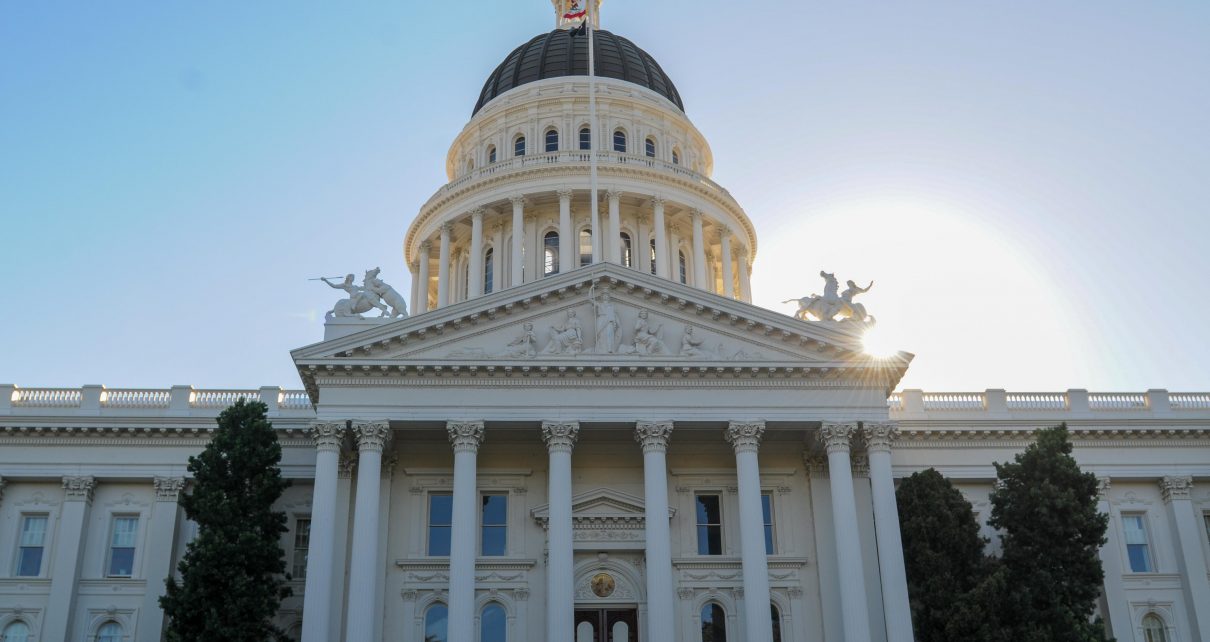
California State Capitol. (Photo: Kevin Sanders for California Globe)
California Courts and Presentation of Fiscal Bills to the Governor
One case explores the actual timing of the presentation of bills
By Chris Micheli, December 31, 2024 2:30 am
Article IV, Section 12(c)(4) of the California Constitution requires appropriations bills to be presented to the Governor for final action after the Budget Bill has been enacted. How have California courts viewed this requirement? One case explores the actual timing of the presentation of bills.
“We next consider plaintiffs’ claim that Assembly Bill 1X 26 is invalid as a pre-budget act appropriation. Assembly Bill 1X 26 was enrolled and presented to the Governor at 4:15 p.m. on June 28, 2011. Senate Bill No. 87 (2011-2012 1st Ex. Sess.) (the Budget Bill) was enrolled and presented to the Governor at 9:45 p.m. that same day. Plaintiffs contend this order of events violates Article IV, section 12(c)(4), even if only by a few hours and even in the absence of any proof that the Governor actually considered Assembly Bill 1X 26 before the Budget Bill.
“They urge the court to adopt a bright line rule declaring the Legislature’s action unconstitutional. We need not decide whether a bright line rule applies, however, because we conclude the circumstances of this case come within one of the constitutional provision’s stated exceptions.
“Article IV, section 12(c)(4) provides in pertinent part: ‘Until the budget bill has been enacted, the Legislature shall not send to the Governor for consideration any bill appropriating funds for expenditure during the fiscal year for which the budget bill is to be enacted, except emergency bills recommended by the Governor or appropriations for the salaries and expenses of the Legislature.” (Art. IV, § 12(c)(4).) One purpose of Article IV, section 12(c)(4), as identified by the Supreme Court, is ‘to enable the Governor to consider the budget bill without a clutter of appropriation measures for the upcoming fiscal year constantly crossing his desk.’ (Jarvis v. Cory (1980) 28 Cal.3d 562, 568 [procedure by which salary appropriation bill was enacted did not violate Art. IV, § 12(c)(4) even though bill became law before budget bill was adopted since the order of enactments was due to the Governor’s veto and not the Legislature’s actions].)
“The plain language of the constitutional provision demonstrates, however, that under certain circumstances, the Legislature may send an appropriation bill to the Governor before the budget bill is enacted. (Jarvis v. Cory, supra, 28 Cal.3d at p. 568.) Here, the State argues the exception for “emergency bills recommended by the Governor” applies. We agree the State’s contention has merit.
“Governor Brown declared a fiscal ‘emergency’ in 2011 as a result of a projected $25 billion budgetary shortfall. (Matosantos I, supra, 53 Cal.4th at p. 250.) As a partial means of addressing this fiscal emergency, the Governor recommended dissolving redevelopment agencies entirely. (Matosantos I, supra, 53 Cal.4th at p. 250; see Legis. Analyst’s Off., The 2011-2012 Budget: Should California End Redevelopment Agencies? (Feb. 9, 2011) p. 1 [“The Governor’s 2011-12 budget includes a plan for dissolving redevelopment agencies and distributing their funds. . ..”]; see also Governor’s Budget Summary—2011-2012 (Jan. 10, 2011) p. 171 [“By July 1, existing [redevelopment] agencies would be disestablished and successor local agencies would be required to use the property tax that RDAs would otherwise have received to retire RDA debts and contractual obligations. . ..”].)
“That is precisely what Assembly Bill 1X 26 did. It dissolved redevelopment agencies like the Governor recommended, thereby making revenue available to address the emergency fiscal situation confronting the state. (See Assem. Bill 1X 26, § 15 [“This act addresses the fiscal emergency declared and reaffirmed by the Governor by proclamation on January 20, 2011. . ..”].) Because Assembly Bill 1X 26 contained an appropriation (see Assem. Bill 1X 26, § 11 [appropriating $500,000 to the Department of Finance to cover administrative costs of the act]; id., § 16 [“This act is a bill providing for appropriations related to the Budget Bill. . ..”]), and was a bill enacted to address an impending fiscal emergency as recommended by the Governor, the Legislature did not violate Article IV, section 12(c)(4) by sending Assembly Bill 1X 26 to the Governor. Under the circumstances, Assembly Bill 1X 26 falls within the ambit of one of the constitutional provision’s express exceptions.”
As a result, as long as the Governor makes the recommendation that a bill is an “emergency bill,” then such an appropriation bill can be presented to the Governor prior to the Budget Bill being enacted.
- California Courts and Special or Extraordinary Sessions - January 8, 2025
- California Courts and Retroactivity of Criminal Statutes - January 7, 2025
- California Courts and the Legislature’s Budget Authority - January 6, 2025




